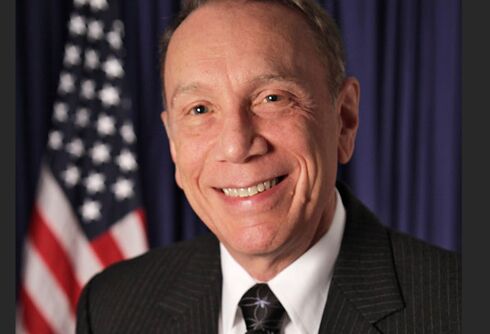Three weeks before his assassination, Dr. Martin Luther King, Jr. arrived in the Detroit suburb of Grosse Pointe, Michigan to deliver what was to be one of the final public speeches of his life. Hundreds of people packed the gymnasium at the local high school to hear the civil rights icon speak. In the audience that night was an 18-year-old boy named Jerry DeGrieck. DeGrieck, already a longtime supporter of the Civil Rights Movement from an early age, was defying an edict from his avowedly racist parents prohibiting him from attending.
DeGrieck’s presence that night, however, was not the only secret he was hiding. Jerry DeGrieck was also gay, and he knew it.
Related:
A lesbian WWII vet was renowned for standing up to Eisenhower. Was it all a lie?
Johnnie Phelps may have fabricated the story, but she was still a pioneering lesbian advocate.
“From the time I was eight years old, I knew that I was different,” he told LGBTQ Nation. “I didn’t even know what the word homosexual was, I never really heard it. But I knew that I was different.”
Never Miss a Beat
Subscribe to our newsletter to stay ahead of the latest LGBTQ+ political news and insights.
700 miles away, in Levittown, New York, Nancy Wechsler’s parents were raising her in a much different way. As ardent socialists, they instilled in the young Nancy a deep commitment to the causes of social and economic justice, including aggressive support for the Civil Rights Movement. She was, as she described, a “red diaper baby.” And like Jerry DeGrieck, Nancy Wechsler knew early on in life that she was gay.
Despite the differences in their upbringings, the shared core values they acquired early in life made it inevitable that DeGrieck and Wechsler would eventually come to know each other as political compatriots when they both began attending the University of Michigan in the early 1970s. As student movement colleagues, they would eventually make history by being elected to the Ann Arbor City Council in April 1972 under the banner of the socialist Human Rights Party.
As members of the Ann Arbor City Council, the pair would spearhead a number of bold initiatives. Within their first few months, they were successful at pushing through several progressive policies that have since become standard in many areas across the country. From a formal declaration of Gay Pride Week, to eliminating local criminal penalties for possession of marijuana, to a Human Rights Ordinance which made Ann Arbor the first city in America to outlaw discrimination in employment, housing and public accommodations on the basis of sexual orientation, DeGrieck and Wechsler’s influence was changing the game in Ann Arbor, as well as the entire United States.
Despite these accomplishments, it is also perhaps fitting that many LGBTQ+ Americans may never have heard the names Jerry DeGrieck and Nancy Wechsler. They have both always believed that individual notoriety should take a back seat to a cause far more important than any one person. “Electoral politics is not about the individual” is a sentiment they both expressed during interviews with LGBTQ Nation. “I viewed electoral politics more as a platform to challenge people and raise issues,” Wechsler said.
It was in the process of raising one of these issues that both DeGrieck and Wechsler would unwittingly make history of their own.
On the night of October 14, 1973, the owner of a local straight bar known as The Rubaiyat had ejected several lesbian patrons for dancing together and kissing. Wechsler, who was part of the group that had been ejected, met the police when they arrived at the scene and attempted to explain that The Rubaiyat’s owner was in violation of Ann Arbor’s Human Rights Ordinance.
“He just looked dumbfounded,” she recalled, “like he actually hadn’t heard of it and didn’t know what to do with what I was saying. And he certainly didn’t inform [the owner] that he was going against the Ann Arbor city ordinance. So, he was not helpful. Police are rarely helpful.”
The police took no action against The Rubaiyat or its owner, Greg Fenerli. Indeed, this inaction fit a pattern of Ann Arbor city officials ignoring complaints of discrimination on the basis of sexual orientation. Since the passage of the Human Rights Ordinance in July 1972, at least a dozen such complaints had been filed with the Ann Arbor Human Rights Commission, with no action taken on any of them by the Ann Arbor City Attorney, Ed Pear. The ordinance was simply not being enforced.
The following day, October 15, the council was set to hear the annual report of Ann Arbor’s Chief of Police, Walter Krasny. Sensing an opportunity to pressure the city to finally enforce the Human Rights Ordinance, Wechsler and DeGrieck made the decision to finally, at long last, come out together during the council meeting.
It was a moment long in the making for DeGrieck.
“I was ready to come out, I really wanted to come out,” he recalled. “I remember going to the University of Michigan Health Services to see a counselor because I wanted help coming out, and I had a few sessions with the counselor and she said to me, ‘I will help you if you want to be straight, but I will not help you come out.’”
In a time before the American Psychiatric Association’s declassification of homosexuality as a mental illness, coming out as gay was seen by many as unthinkable, much less for anyone serving in elected office.
Despite all this, in their statements before the council that day, both DeGrieck and Wechsler did the unthinkable. They came out. In so doing, they became the first openly LGBTQ+ elected officials in American history. Before Harvey Milk, Barney Frank, Danica Roem, or any of the other hundreds of openly LGBTQ+ elected officials that have come since, there was simply Jerry and Nancy, fighting for the enforcement of the historic ordinance they themselves had championed.
“I remember it feeling really good to just come out,” Nancy Wechsler recalled, “even though there was a lot of pushback and shock. I remember people on the city council could barely look at us, they just looked disgusted. It’s like it was bad enough that we were these lefty, socialist, union-supporting people who helped organize demonstrations that actually shut down city council meetings, but then we were queer, too?!”
Over the following months, in the face of both public and private backlash, Jerry and Nancy continued to advocate for proper enforcement of the Ann Arbor Human Rights Ordinance, sharply criticizing both Chief of Police Walter Krasny and City Attorney Ed Pear for their inaction. By the time their terms were up the following April, however, they both nonetheless had come to realize it was time to move on.
“Before I was on the City Council I used to walk around Ann Arbor by myself a lot and just relax and walk. After I was on the City Council I didn’t have that kind of privacy…” Wechsler recollected. Following the death of her mother that December, the decision to move on from Ann Arbor and political life was an easy one.
DeGrieck, meanwhile, was initially keen on running for a second term, but eventually realized, as he and Nancy had always sought to stress, “Electoral politics is not about the individual.” He also decided not to run again in April 1974. The following month, the City of Ann Arbor undertook its first ever enforcement action under the Human Rights Ordinance for an act of anti-gay discrimination, with City Attorney Ed Pear filing suit against the owner of a local motel for firing a gay employee.
In the fifty years since, both Wechsler and DeGrieck have laid down roots worlds away from the Michigan college town where they both humbly etched their names into history. DeGrieck has since relocated to Seattle, where he went to work for the King County Department of Public Health, recently retiring after helping to lead the county’s COVID-19 response. Wechsler has since settled in Cambridge, Massachusetts and has continued to be involved in a number of social and economic justice causes.
Of their contributions to the movement and their importance to LGBTQ+ elected officials across the United States over the past fifty years, Speaker pro tempore of the Michigan House of Representatives Laurie Pohutsky — herself openly bisexual — had the following to say:
“It’s hard to overstate just what Jerry DeGrieck and Nancy Wechsler coming out means for all of us openly LGBTQ elected officials who have served since. Being the first of anything comes with great responsibility, anxiety, and fear, and all of that was of course compounded by the time during which Jerry and Nancy came out. All of us who have followed in their footsteps owe them an enormous debt of gratitude for their courage, and while barriers of bigotry and hatred still exist for LGBTQ elected officials, we can draw from the example that Jerry and Nancy set by knocking down the very first one.”
Reflecting on the current challenges confronting the LGBTQ+ community, DeGrieck reserved specific ire for members of the community who refuse to support the rights of transgender people.
“I can’t stand it when some gay people, particularly gay men, don’t see trans issues as their issue. I think that that is really pathetic,” DeGrieck said. “Trans people are some of the most marginalized folks in this country and are scapegoated. How a young person who is trans feels and is impacted by all of the marginalization, hate and dismissiveness is just something we cannot tolerate.”
He singled out Montana State Representative Zooey Zephyr for special praise.
“We need trans leaders like Zooey Zephyr of Montana to be out there. To know us is to love us. A lot of people used to not know that there were lesbians and gays in their midst. I think the more out people are, the more other people know them, and I think that makes a difference.”
It is a sentiment which harkens back to that fateful evening in the gymnasium at Grosse Pointe South High School. It was the night DeGrieck defied the prejudice of his own family to hear Dr. Martin Luther King, Jr. and the overwhelming moral authority with which he spoke for what would prove to be one of the last times.
In the midst of his speech at Grosse Pointe, Dr. King uttered a simple yet profound truth, which rings out across all backgrounds, and across all struggles for justice and human dignity: “I still believe that freedom is the bonus you receive for telling the truth. Ye shall know the truth and the truth shall set you free.”
















